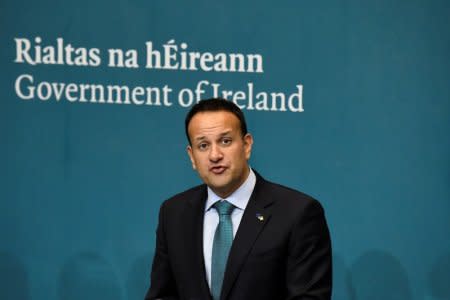Irish parliament overwhelmingly backs Brexit divorce deal

Thomson Reuters
DUBLIN (Reuters) - Ireland's parliament overwhelmingly backed the divorce deal struck last week by Brexit negotiators, with all major parties supporting the draft agreement that the government says achieves all its key priorities.
Although a vote was not legally necessary -- ratification is only needed in the European Parliament and, far tricker, the British parliament -- Irish Prime Minister Leo Varadkar wanted to show that politicians from all sides supported his position.
As fewer than 10 members of the 158 in parliament stood up against the motion, the speaker of the house declared it carried.
The draft divorce deal for Britain's exit from the European Union is set to be approved by EU leaders on Sunday, alongside a political declaration on future trade, with the arduous task then falling to Prime Minister Theresa May to win over a majority of skeptical British lawmakers.
"The support of this house for the draft withdrawal agreement, I am sure will send a strong signal ahead of the European Council on Sunday that Ireland is behind this deal fully," Foreign Minister Simon Coveney said.
Varadkar enjoyed cross-party support throughout the talks in a bid to avoid the return of border checks between EU-member Ireland and the British province of Northern Ireland, which many feel would threaten a 20-year-old peace deal that ended three decades of sectarian bloodshed in Northern Ireland.
The agreement includes a provision that would avoid such checks returning, with the so-called Northern Ireland backstop responsible for much of the disquiet among Theresa May's own party.
Wednesday's motion was supported by Sinn Fein, the Irish nationalist party whose lawmakers sit in both the parliament in Dublin and devolved assembly in Belfast, but refuse to take the seven seats they currently hold in the British parliament.
The party contests British elections in the province on the understanding that they will not sit in parliament because they oppose the British government's jurisdiction in Northern Ireland and do not want to make an oath to the British queen.
The party's leadership insists that they will not make an exception for the Brexit vote in London in the coming weeks.
(Reporting by Padraic Halpin; Editing by Leslie Adler)
See Also:

 Yahoo News
Yahoo News 
